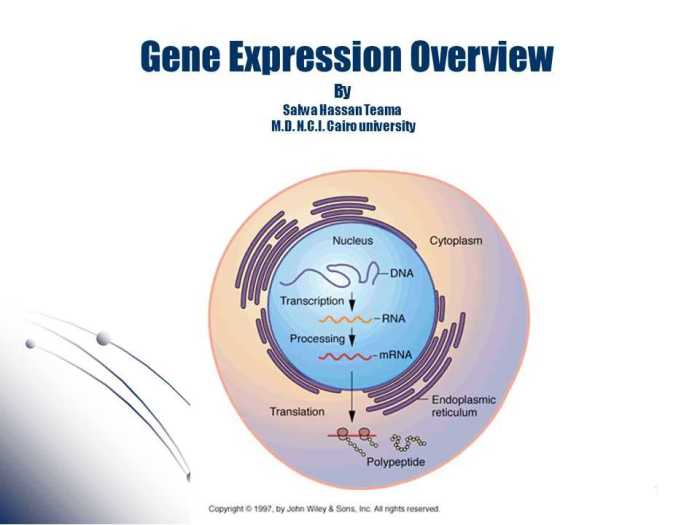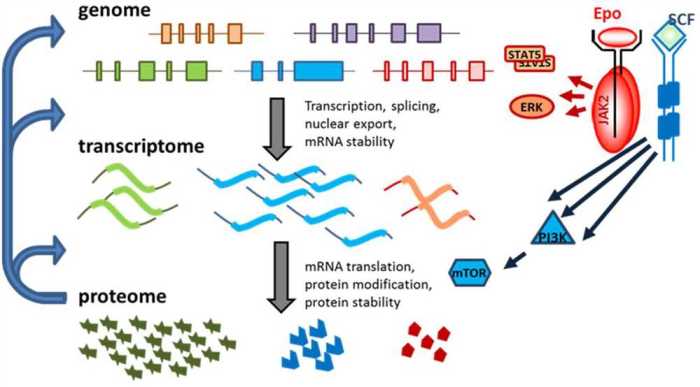At the heart of molecular biology lies gene expression translation pogil key, a fundamental process that orchestrates the intricate symphony of life. This key unlocks the genetic code, transforming the blueprint of DNA into the functional proteins that drive cellular processes, development, and disease.
Embark on an illuminating journey as we delve into the fascinating world of gene expression and translation.
Gene expression translation pogil key encompasses the processes of transcription and translation, where genetic information flows from DNA to RNA to protein. It governs the production of proteins, the workhorses of cells, which perform a myriad of functions, from metabolism and growth to immune response and cell signaling.
Gene Expression and Translation
Gene expression and translation are fundamental processes that allow living organisms to function. Gene expression is the process by which the information encoded in DNA is used to produce functional proteins. Translation is the process by which the mRNA produced during gene expression is used to synthesize proteins.
Transcription
Transcription is the first step in gene expression. It is the process by which the DNA sequence of a gene is copied into a complementary RNA molecule. This RNA molecule, called messenger RNA (mRNA), is then transported out of the nucleus and into the cytoplasm, where it is translated into protein.
Translation
Translation is the process by which the mRNA produced during transcription is used to synthesize proteins. This process occurs on the ribosomes, which are large protein complexes located in the cytoplasm. The ribosomes read the mRNA sequence and use it to assemble the correct sequence of amino acids into a protein.
Regulation of Gene Expression
Gene expression is a tightly regulated process. There are a number of different mechanisms that can be used to regulate gene expression, including:
- Transcription factors: Transcription factors are proteins that bind to specific DNA sequences and either promote or repress transcription.
- Epigenetic modifications: Epigenetic modifications are chemical changes to DNA that can affect gene expression without changing the DNA sequence itself.
- MicroRNAs: MicroRNAs are small RNA molecules that can bind to mRNA and prevent it from being translated.
The Importance of Gene Expression and Translation

Gene expression and translation are essential for life. These processes are responsible for producing the proteins that are needed for all cellular processes, including metabolism, growth, and reproduction. Gene expression and translation are also essential for development. The correct expression of genes is required for the development of all tissues and organs.
Cellular Processes
Gene expression and translation are essential for all cellular processes. Proteins are the workhorses of the cell, and they are responsible for carrying out a wide range of functions, including:
- Metabolism: Proteins are essential for metabolism, the process by which cells convert food into energy.
- Growth: Proteins are required for cell growth and division.
- Reproduction: Proteins are required for the reproduction of cells.
Development
Gene expression and translation are also essential for development. The correct expression of genes is required for the development of all tissues and organs. For example, the expression of the gene Pax6 is required for the development of the eye.
Health and Disease
Gene expression and translation are essential for health and disease. The dysregulation of gene expression can lead to a number of diseases, including cancer, diabetes, and heart disease.
Methods for Studying Gene Expression and Translation
There are a number of different experimental techniques that can be used to study gene expression and translation. These techniques include:
Northern blotting
Northern blotting is a technique that can be used to detect the presence of specific mRNA molecules in a cell. This technique involves extracting RNA from a cell and then running it on a gel. The RNA is then transferred to a nitrocellulose membrane, which is then probed with a labeled DNA probe that is complementary to the mRNA molecule of interest.
Western blotting
Western blotting is a technique that can be used to detect the presence of specific proteins in a cell. This technique involves extracting proteins from a cell and then running them on a gel. The proteins are then transferred to a nitrocellulose membrane, which is then probed with a labeled antibody that is specific for the protein of interest.
Microarrays
Microarrays are a high-throughput technique that can be used to measure the expression of thousands of genes simultaneously. This technique involves using a DNA chip that contains complementary DNA sequences for the genes of interest. RNA from a cell is then labeled and hybridized to the DNA chip.
The amount of hybridization that occurs for each gene is then measured, which provides a measure of the expression level of that gene.
Applications of Gene Expression and Translation Research
Gene expression and translation research has led to a number of advances in medicine, biotechnology, and agriculture. These advances include:
Medicine
Gene expression and translation research has led to the development of new treatments for a number of diseases, including cancer, diabetes, and heart disease. For example, gene therapy is a technique that involves using genes to treat diseases. This technique involves introducing a healthy gene into a patient’s cells in order to correct a genetic defect.
Biotechnology
Gene expression and translation research has also led to the development of new biotechnology products, such as genetically modified crops and biofuels. Genetically modified crops are crops that have been modified using genetic engineering techniques. These crops are often resistant to pests and diseases, and they can also be more nutritious than traditional crops.
Agriculture
Gene expression and translation research has also led to the development of new agricultural products, such as drought-tolerant crops and crops that are resistant to pests and diseases. These products can help to increase food production and reduce the need for pesticides and herbicides.
Ethical Considerations in Gene Expression and Translation Research: Gene Expression Translation Pogil Key

Gene expression and translation research has the potential to provide great benefits to society. However, there are also a number of ethical concerns that need to be considered when conducting this research. These concerns include:
The potential for misuse
Gene expression and translation research has the potential to be misused. For example, this research could be used to create genetically modified humans or to develop biological weapons.
The potential for unintended consequences, Gene expression translation pogil key
Gene expression and translation research could have unintended consequences. For example, genetically modified crops could have negative effects on the environment or on human health.
The need for informed consent
Individuals who participate in gene expression and translation research should be fully informed about the risks and benefits of the research. They should also be given the opportunity to make informed decisions about whether or not to participate in the research.
FAQ Corner
What is the significance of gene expression translation pogil key?
Gene expression translation pogil key is crucial for all cellular processes, including metabolism, growth, development, and disease. It allows cells to produce the proteins they need to function and respond to their environment.
How is gene expression regulated?
Gene expression is regulated at multiple levels, including transcription, translation, and protein degradation. Various factors, such as transcription factors, regulatory RNAs, and epigenetic modifications, can influence gene expression.
What are the ethical considerations associated with gene expression translation pogil key research?
Gene expression translation pogil key research raises ethical concerns related to gene editing and genetic technologies. It is important to consider the potential risks and benefits of these technologies and establish responsible guidelines for their use.